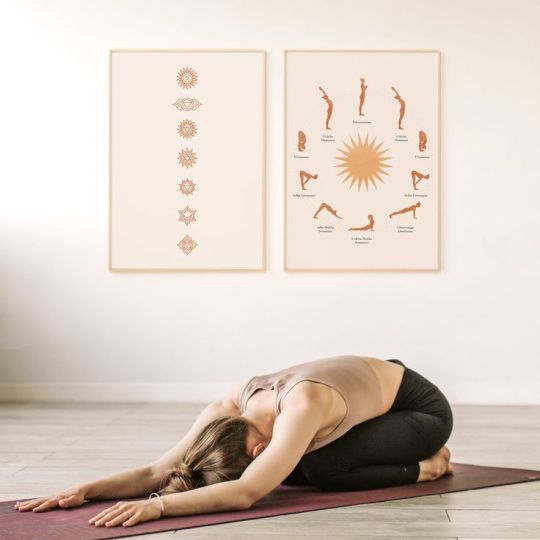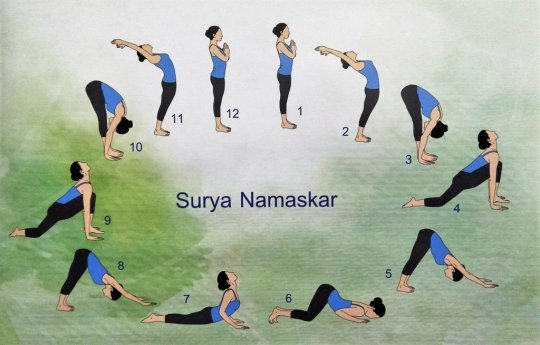#Health Surya Namaskar
Explore tagged Tumblr posts
Photo

(via Yoga Poster Chakras Decor Yoga Art Digital Print Boho Decor Spiritual Decor Instant Download Yoga Wall Art Mindfulness Gift - Etsy | Yoga poster, Yoga wall art, Yoga art || Curated with love by yogadaily)
#balasana#sunsalutation#surya namaskar#yogabun#chackras#yoga#yogi#yogini#yogapose#yogaposes#asana#asanas#yogainspiration#yogamotivation#Law of Attraction#law of assumption#manifestation#manifest#manifesting#yogadaily#fitness#health & fitness
24 notes
·
View notes
Text
How Surya Namaskar Boosts Your Health: 20 Benefits
Surya Namaskar, or Sun Salutation, is a sequence of yoga postures that is renowned for its numerous health benefits. This dynamic practice, often included in various yoga teacher training programs, such as the 300 hour yoga teacher training in Rishikesh or the 300 hour yoga TTC in Rishikesh, offers a holistic approach to health and well-being. Whether you’re participating in a yin yoga training in Rishikesh or embarking on a yoga teacher certification in Rishikesh, integrating Surya Namaskar into your routine can profoundly enhance your physical and mental health. Here’s a closer look at the 20 key benefits of Surya Namaskar:

Improves Flexibility: Regular practice of Surya Namaskar helps to increase flexibility by stretching and strengthening various muscle groups. This is especially beneficial for those undergoing a yoga teacher training in Rishikesh.
Enhances Strength: The sequence of postures builds muscular strength, particularly in the core, arms, and legs. This is a valuable addition to the best yoga teacher training Rishikesh programs.
Boosts Cardiovascular Health: Surya Namaskar is an effective cardiovascular workout that can improve heart health and stamina.
Promotes Weight Loss: The flowing sequence of poses helps burn calories, making it an excellent practice for weight management.
Improves Digestion: The forward bends and stretches in Surya Namaskar stimulate digestive organs, promoting better digestion and metabolism.
Detoxifies the Body: The practice enhances blood circulation and helps in the elimination of toxins, supporting overall detoxification.
Enhances Mental Clarity: Regular practice can improve concentration and mental clarity, benefiting those involved in meditation teacher training Rishikesh.
Reduces Stress: Surya Namaskar promotes relaxation and reduces stress levels, making it an essential practice in any yoga training Rishikesh program.
Balances Hormones: The sequence helps in balancing hormones, which can contribute to overall hormonal health.
Strengthens the Immune System: By promoting better circulation and detoxification, Surya Namaskar helps in strengthening the immune system.
Improves Posture: Regular practice aids in improving posture and alignment, which is crucial for yoga teachers and practitioners alike.
Enhances Flexibility of the Spine: The practice involves a lot of spinal flexion and extension, which helps in maintaining a healthy spine.
Increases Lung Capacity: The synchronized breathing with the postures enhances lung capacity and improves respiratory health.
Promotes Better Sleep: By calming the mind and reducing stress, Surya Namaskar can contribute to improved sleep quality.
Boosts Energy Levels: The dynamic nature of the practice helps to invigorate the body and mind, leading to increased energy levels.
Improves Circulation: The sequence stimulates blood flow, which is beneficial for overall cardiovascular health.
Supports Joint Health: The gentle stretching involved in Surya Namaskar helps in maintaining healthy joints and reducing stiffness.
Enhances Mental Focus: The meditative aspect of Surya Namaskar helps in sharpening mental focus and clarity.
Builds Discipline: Regular practice fosters discipline and commitment, which are valuable traits for anyone undergoing a yoga teaching course Rishikesh.
Promotes Holistic Well-Being: Surya Namaskar integrates physical, mental, and spiritual aspects, supporting overall well-being and balance.
Incorporating Surya Namaskar into your daily routine can have a profound impact on your health. Whether you're pursuing a 300 hour yoga teacher training in Rishikesh, exploring a yin yoga training Rishikesh, or simply looking to improve your well-being, the benefits of Surya Namaskar are truly remarkable. Embrace this practice to experience its transformative effects on your body, mind, and spirit.
#100 hour yoga teacher training#300 hour yoga teacher training#300 hour yoga teacher training india#yoga teacher training#surya namaskar#500 hour yoga teacher training#Surya Namaskar Boosts Your Health#benefits of Surya Namaskar
0 notes
Text
Surya Namaskar Benefits: सूर्य नमस्कार एक ऐसा योग है, जो आपको हेल्दी रहने में काफी मदद कर सकता है। इसके लिए आपको रोज बस 10 मिनट का समय निकालना है। हालांकि इसे सुबह सूर्योदय के समय करने की कोशिश करें और हमेशा खाली पेट ही करें।
0 notes
Text
I tried doing suryan namaskar today,it was quite good experience and I felt refreshed after doing 10 set of it. I must say it was bit tough for beginners like me but I believe after doing for sometimes I'll get use to it. It consists of 12 steps and each has its significance.

0 notes
Text
Hello Friends,
Do you know what is the best exercise for whole body? Only one exercise is beneficial for whole body. This is more than 2500 years old exercise that has proven health benefits. This is called Surya namaskar (Sun salutations). Check here amazing benefits of sun salutations.
1 note
·
View note
Text
youtube
9 Great BENEFITS OF YOGA FOR HEALTH
Yoga is known as one of the practices that enhances both physical and mental health, helping improve your life. Practicing yoga postures brings numerous benefits to overall health and supports healing. Let's explore 9 wonderful benefits that yoga brings to us.
#benefits of yoga#yoga benefits#butterfly yoga benefits#benefits of yoga essay#benefits of yoga speech#yoga benefits for women#vajrasana yoga benefits#yoga benefits in tamil#benefits of hot yoga#yoga benefits in hindi#yoga benefits for men#yoga nidra benefits#surya namaskar yoga benefits#yoga#yoga postures#breathing exercises#spiritual meditation#poses health benefits of yoga#yoga for health#what does yoga do for the body#what does yoga do to your body#what does yoga do#what does yoga do to your body and brain#yoga for weight loss#yoga with adriene#yoga for beginners#yoga nidra#yoga music#morning yoga#yoga with kassandra
1 note
·
View note
Video
youtube
(via The Benefits of Surya Namaskar and The Science Behind It) The benefits of Surya Namaskar is phenomenal for our overall well-being. This graceful sequence of twelve poses with a continuous flowing motion and deep breaths calms the mind, elevates the spirit and heals the body.
0 notes
Text
Debilitated planets in astrology

Sun in Libra ⚖️
Sun in Libra is debilitated because sun's aggressive and assertive nature does not go well with Libra's love for harmony and balance. The most common thing that comes with a debilitated sun is the lack of confidence. I know many people with this placement who are actually really good leaders but because they are not confident in their own abilities, they tend to hold themselves back. No matter how much other people praise them, they'll always think that they're not good enough. Can also be people pleasers, I personally think that you guys should not be in a relationship unless you strengthen your sun. They are much more likely than others to be victims of peer pressure. There can be some problems with heart, bones, or stomach, or it's like, your stomach is the first thing that hurts when you get sick, migraines and fevers are also common. To strengthen your sun, you should do the following things, (do the things that you can, you don't have to do every single one, I'm listing down all the ones that I know) :
Perform Surya namaskar or just do yoga in the morning.
Use a copper glass to drink water.
Offer water to sun every morning (when it rises) from a copper vessel.
Look at the sunrise with your eyes, if you wear glasses, remove the glasses and then look at it. JUST as the sun is rising, don't wake up at 11 am, and then look at the sun.
You shouldn't eat a lot of meat, I'm not telling you to become a vegetarian, but do lessen the consumption of meat and try to eat more fruits and vegetables instead.
Wear red colored clothes more often, and also donate red colored clothes to orphanages, it can be helpful.
If you're a Hindu and you LIKE being a Hindu, then chant this, "om suryaya namaha" 3 times in the morning before leaving your house or if you're offering water to sun then do it that time only.

Moon in Scorpio 🦂
Moon is debilitated in Scorpio. People with a debilitated moon are highly prone to stress, much more than others, they also very easily get Black circles under their eyes, it's like, even if they sleep a little less for a day, you'll see it on their faces, their hair starts turning grey very early on in life. They can have sinus problems and be prone to allergies. Also, I read this somewhere, but it's turned out to be true for every person that I know has a weak moon, their sweat smells very very bad, I'm sorry 😭. They can also be scared of water, not like bathing and regular stuff but swimming and doing water sports. HUGE mood swings, one moment they're shouting at you and the next they're asking for a hug and talking sweetly. Highly sensitive to criticism, will get offended at the smallest things, this results in them being very defensive over their interests and lifestyle. Their intuition is weak and they can struggle to figure out the true intentions of people, can get very easily manipulated. Lactose intolerance is something that I've noticed in a lot of people with a weak moon. Can have problems with mental health, like anxiety and adhd, weak chest, breast, ovaries, uterus, problems with menstrual cycle, irregular periods, fertility issues. cold and cough are very common. To strengthen your moon, you should do the following things :
Avoid spending time alone.
Practice meditation every day to calm down the mind.
Offer milk to shivaling if you can.
Avoid having birds as pets.
Eat coconut and wear white clothes, or even wearing a white scarf with usual clothes is fine.
You should also use sandalwood oil to improve sleep or use it while meditating as well.
Chant "Om Shram Shreem Shroum Sah Chandramase Namah" 3 times everyday, do it while meditating.

Mercury in Pisces 🐟
Mercury is debilitated in Pisces. Communication problems are a given with this placement. People can misunderstand their words quite often, it's like, even when they're trying to compliment someone, it sort of ends up sounding like an insult, when that wasn't their interntion in the first place. They can be the "invisible" friend in the group, it's like even if they go away nobody will notice or be affected by their absence. The friend who always has to walk behind when there's no space left, the one that is left behind when they stop to tie their laces, the one that tries to be social and funny but ends up failing miserably. They feel alone even if they're surrounded by people. This is especially true when they're young, but they look at all these people around them, having fun, dating, partying, and then they're just THERE, just existing, that feeling is common. Overthinking, nobody can beat them to it, sitting in class, having a doubt but not bringing it up cuz you're afraid of being perceived as stupid. They're also very sensitive to criticism. They do have a really strong intuition though, can see right through people, good judge of characters. Frequently engage in maladaptive daydreaming, will act like a princess whose knight is in love with her, but she is forced to marry a prince from another kingdom, frequently cook up stories like this in their heads (totally not speaking from personal experience). They daydream to avoid reality, but like who doesn't. There can be problems related to throat, nervous system, ulcers, fractures, UTI's, iron and haemoglobin issues as well. To strengthen your Mercury, you should do the following things :
Wash new clothes before wearing them.
Chanting mantras related to lord budhha.
Eat green vegetables and fruits
Keep good oral hygiene, clean your teeth and tongue THOROUGHLY (everyone should do this btw, cuz...basic hygiene)
Chant "Om gan ganpataye namah" 3 times in the morning before leaving your house

Venus in Virgo 🦊
Venus is debilitated in Virgo. These people can be very critical of their partners, will always try to find faults with them. Can be overly concerned with outer appearances. They struggle a lot with self love, Cassie from euphoria is a pretty accurate representation of someone with a debilitated Venus. They have low self esteem and as a result, can get together with people who try to pull them down and the worst part is that they tend to believe them. They have a bad fashion sense, they're more likely to follow trends, not realising that those clothes are not the best for THEIR body type. Dependency issues in relationship is very common. They are creative, but don't know how to express it, most of the times, they're not even aware of this creativity. They can also be more prone than others to get addicted to alcohol or drugs, so I would advise you to stay away from them. If you haven't consumed it yet, then it's better to not even try. Can have problems related to kidneys, skin, eyes, sexual hormones (PCOS is common in women with this placement), hormonal disorders. To strengthen your Venus, you should do the following things :
You should avoid taking anything for free, for ex, you know how in some stores they offer things to taste, like snacks and all, don't try them.
You should use cow ghee to cook food.
Wear silver jewellery and use nice perfumes.
Pour white flowers in water, preferably a big body of water.
Never repeat your clothes without washing them first. Don't wear unwashed clothes.
Chant "Om shum shukraya Namah"

Mars in Cancer 🦀
Mars is debilitated in Cancer. These people are always a little lethargic, the type to wake up tired no matter how much sleep they get (yk that meme, that goes "when you wake up and can't wait to go back to sleep". They don't like to eat healthy food, can be obsessed with eating junk all the time. I know people with this placement who are ADDICTED to cheese, won't eat anything without it. Can get bruised very easily and most of the time they aren't even aware of how they got it. Get frequent body pains because of weak muscles. Don't know how to express their sexuality in a healthy manner. They have Weak concentration skills and low attention span. There can be property related disputes in the family, you'll probably not inherit anything (good) from your family. They use displacement as their defence mechanism, anger is always directed at the wrong person because they're too weak to hurt the people who've hurt them. They can be very passive aggressive. There can be problems related to bones, muscles, blood, genitals, rectum, hands and prostate gland. To strengthen your mars, you should do the following things :
You should donate blood.
Carry red things with you, it shouldn't be too big, small enough to fit in your pocket.
Eat red fruits and vegetables, like, pomegranates, beetroot, apple, cherry, red pepper, etc.
Chanting or reading Hanuman chalisa can help a LOT ( I would give an example but the whole situation was very detailed)
Use copper utensils to eat food and drink water in a copper glass.

Jupiter in Capricorn 🐐
Jupiter is debilitated in Capricorn. For some weird reason, they always get teachers who have a problem with them. Their teachers always pin point their faults and try to humiliate them. But when they grow old, like 25+ they finally manage to find someone who does their best to guide them, this teacher will have a huge impact on their life. They are likely to become more spiritual and less religious as they grow up. I know a lot of people with this, and they all ended up becoming the head of their household, it doesn't matter if they're a man or a woman, married or divorced, they are gonna be the ones to manage their family. There will be a lot of difficulties in terms of career, you might have to work twice as hard as others to get the same benefits. There can be financial difficulties as well, it usually happens because most of the time, these people are the breadwinners, so whatever they earn, gets used for their family instead. So it FEELS like they earn less even if they earn a lot. This is a very bad placement for women, since the probability of getting a bad husband increases. The women with this get ghosted a lot. You can be more prone than others to health problems like, diabetes, obesity, insomnia, gall bladder stones, ear and gastric troubles. To strengthen your Jupiter, you should do the following things :
Apply a blend of turmeric powder and sandalwood on your forehead, a short line with your thumb (dip your thumb in the mixture and then put your thumb between your eyebrows and draw a ⬆️ line)
Offer bananas to people.
Avoid consuming meat and alcohol.
Wear yellow clothes (avoid wearing dark Colors) or keep something yellow with you permanently.
Practice meditation.
Wear gold, it can be a small chain or a ring as well.
Chant "Om brim brihaspataye namah"

Saturn in Aries 🐏
Saturn is debilitated in Aries. These people are very irresponsible and make fake promises. They'll do everything except what they're actually supposed to do. Have a tendency to blame others for their failures, I know quite a few people with this and.....🙄. These people are not good leaders but they think they are, this leads to them taking leadership roles through force. They look scary and they ARE scary, nobody can stand up to them. They're unable to manage resources effectively and this can lead to severe financial difficulties. They also end up making a lot of enemies, so even if they become successful, it won't be for long. There can be problems related to, legs, knees and joints. To strengthen your Saturn, you should do the following things :
Brush your teeth with a neem toothpaste.
Honestly, be a vegetarian, this is the only planet for which I would recommend you guys to NOT consume meat and alcohol. I know 100's of people who were literally dying during their Saturn mahadasha and then became perfectly fine once they stopped eating meat and drinking alcohol.
Be a decent human being, that is literally all that Saturn asks of you 😭
Drink cow milk ONLY, if that's not available then don't drink milk.
Always keep a little ball of silver with you.
Wear dark green clothes.

(there are many factors that can cancel the debilitation of a planet, and these remedies help too, so don't worry too much if you have planets in debilitation)
Divider by @strangergraphics-archive
© martian-astro All rights reserved, 2024
#astrology#astrology community#vedic astrology#vedic astro notes#astrology content#astroblr#astro observations#sidereal astrology#astrology observations#astro notes#vedic astro observations#vedic observations#sun in libra#moon in scorpio#mercury in pisces#venus in virgo#mars in cancer#jupiter in capricorn#saturn in aries#astro community
720 notes
·
View notes
Note
Hellooo, I was wondering what were your thoughts on sun darakaraka in 12H in Uttara Bhadrapada pleasee
Hello. 🌻
The partner will have confidence , strength, talent and a sense of regality , will be spiritual, independent, may be involved in yoga , meditation , behind the scene professions , research labs , scientists , hospitals, etc . May belong to a foreign culture or origin/land.
Also take good care of your health & vitality. Do Surya namaskar if you can :).
#astrology#astro observations#counseling#astrology observations#vedic#vedic astro notes#astro notes#vedic astro observations#astrology blog#astrologer
3 notes
·
View notes
Text
PMS Relief: Find What Works for You

Introduction:
PMS is a state experienced by many women whose symptoms show up within 1 to 2 weeks before the start of menstruation, and they revolve mostly around hormonal changes affecting physical, mental and emotional conditions. Identifying ideal therapies for PMS that would improve daily functioning, is also useful. This blog will address: natural and non-pharmacological approaches to treating PMS symptoms, which will be explained through recommendations on lifestyle modifications, dietary changes, and other medicine for premenstrual syndrome.
What is PMS?
PMS is a hormonal disease that focuses on the fluctuations in levels of estrogen and progesterone hormones. Such hormonal changes have several effects on the body, including tender breasts, weight gain, mood swings, irritability, and constant fatigue. As for the present article, it is important to understand the origins of these symptoms in order to find the cure.
Symptoms of PMS:
PMS symptoms can vary widely but often include:
Mood swings
Irritability
Fatigue
Bloating
Breast tenderness
Headaches
Anxiety
Depression
These symptoms are due to alterations in interact function between steroids and hormones such as dopamine, serotonin, and oxytocin.
Natural Ways to Manage PMS:
1. Increase Serotonin Levels Naturally:
Serotonin is a neurotransmitter which has an impact on person’s feelings. It has been preceded that inositol enhances serotonin signaling and that low levels of serotonin are associated with mood swings and depression, both of which are symptoms of PMS. Here are some types of foods that directly enhance serotonin:
Diet Tips:
Make sure to consume products containing complex carbohydrates such as rice, fruits and vegetables.
One should take products rich in lean protein for instance chicken fish and beans.
Take monounsaturated fats in nuts, seeds and avocados since they help reduce cholesterol levels.
This means that one should refrain from consuming foods in boxes, sugary foods, and foods that contain caffeine.
2. Stop Being a Night Owl:
Another crucial principle of daily life and hormonal balance is wake-sleep cycling or rhythmicity. It was also found that lack of sleep would lead to aggravation of PMS.
Sleep Tips:
The recommended amount of hours for sleep is between seven and nine hours for a competent level of functioning.
Stay on a regular sleep-wake schedule and avoid sleeping during the day hours.
Ponder on the creation of a relaxing bedtime regimen of reading or bathing with warm water.
This means that activities that involve use of screens or anything that would stimulate the brain should be avoided just before sleeping.
3. Take Sun Baths and Engage in Physical Activity:
In addition to affected mental health conditions, natural sunlight exposure and subsequent physical activities can improve many PMS symptoms. It assists the body in the synthesis of vitamin D, which plays a critical role in mood as well as in the body’s general wellbeing.
Activity Tips:
Get 15 to 20 minutes of sunlight exposure per day.
Perform activities such as yoga, exercise, Surya Namaskar or morning walking which enhances the secretion of endorphin thus helping to calm the nerves.
Physical activity contributes to the regulation of hormonal levels, elevates one’s spirits, and combats bloating.
Understanding the Role of Neurotransmitters:
Neurotransmitters like dopamine, serotonin, and oxytocin are known to cause or exacerbate PMS symptoms.
Dopamine: Associated with pleasure and reward system. Whereas, low levels can cause depression and lack of aspiration or motivation. The levels of dopamine can be increased through exercises as well as fun activities.
Serotonin: Closely related to mood control and modulation. Tasty foods, drinks, and regular exercise help to enhance the serotonin level in the human body.
Oxytocin: It is popularly referred to as the ‘cuddle hormone’ since it aids in the bond formation and the calming effect. Oxytocin level can be boosted through participation in activities such as those involving yoga, interpersonal communication, and touching.
Finding the Right Medicine for Premenstrual Syndrome:
While lifestyle changes can manage PMS, some may need medication. Consult a healthcare professional to explore options like these:
Over-the-counter pain relievers such as ibuprofen and aspirin.
Hormonal treatments like birth control pills to regulate hormone levels.
Antidepressants, mainly selective serotonin reuptake inhibitors (SSRIs), for severe mood-related symptoms.
Moreover, “Upasham Tablets” by Abhinav Healthcare are natural remedies that have shown fairly promising results for PMT patients. This Ayurvedic medicine effectively helps in treating various PMS symptoms through the use of natural ingredients that balance hormones and reduce discomforts.
Conclusion:
Effectively managing premenstrual syndrome necessitates a holistic approach including dietary improvements, changes in lifestyle and medical interventions when necessary. Appreciating the hormonal and neurotransmitter aspects of PMS enables one to make decisions on how to minimize these symptoms and improve quality of life. Importantly, what works for one person may not work for another; therefore it is important to find the right combination of approaches that will suit you best.
Upasham Tablets from Abhinav Healthcare could be worth considering by anyone searching for Ayurvedic medicine for premenstrual syndrome and menstrual irregularities. The right blend of dietary modifications along with an appropriate drug regimen can go a long way towards managing PMS effectively while also enhancing physical issues.
Resource:
2 notes
·
View notes
Photo

(via Pin by just4yoga on yoga | Yoga || Curated with love by yogadaily)
#surya namaskar#yoga#yogi#yogini#yoga daily#manifesting#fitness#health and fitness#asana#yoga poses#motivation#inspiration#Aesthetic
15 notes
·
View notes
Text
The Role of Yoga and Ayurveda in Diabetes Management
Healing from Within: The Role of Yoga and Ayurveda in Diabetes Management
Step into a world where ancient wisdom meets modern science as we explore the profound impact of yoga and Ayurveda on diabetes management. In an era of escalating stress and sedentary lifestyles, the holistic approach of these ancient practices offers a beacon of hope in the management of diabetes. Through targeted postures, breathwork, and meditation, yoga unfolds its therapeutic benefits, promoting insulin sensitivity and reducing blood sugar levels. Meanwhile, Ayurveda, with its personalized approach, delves into herbal remedies, dietary modifications, and lifestyle recommendations to restore the body's balance and vitality. As we delve into the nexus of these time-honored practices and the contemporary understanding of diabetes, discover how their integration can empower individuals to embark on a transformative journey towards holistic well-being. Join us as we unravel the compelling synergy between ancient traditions and modern diabetes management, offering a roadmap for self-healing from within.
Understanding Diabetes and its Management
Diabetes is a chronic condition characterized by high levels of glucose in the blood. It can result from inadequate insulin production, ineffective use of insulin, or both. The management of diabetes involves controlling blood sugar levels to prevent complications. Conventional treatments often include medication, insulin injections, and dietary modifications. However, the holistic approach of yoga and Ayurveda offers complementary avenues for managing diabetes. By understanding the underlying causes and impacts of diabetes, individuals can make informed choices about incorporating these ancient practices into their lifestyle.
Yoga and Ayurveda offer a holistic perspective on diabetes, considering the interconnectedness of mind, body, and spirit. Rather than simply treating the symptoms, they address the root causes of imbalance, aiming to restore harmony and well-being. As we delve deeper into the specific practices and principles of yoga and Ayurveda, we will uncover their profound potential in transforming the lives of those grappling with diabetes.
Yoga Practices for Diabetes Management
Yoga, an ancient practice originating in India, encompasses a diverse range of techniques designed to promote physical, mental, and spiritual well-being. When tailored for diabetes management, yoga practices can play a crucial role in regulating blood sugar levels and enhancing overall health. Asanas, or yoga postures, are a fundamental aspect of yoga practice. Specific asanas, such as the Sun Salutation (Surya Namaskar), the Shoulder Stand (Sarvangasana), and the Seated Forward Bend (Paschimottanasana), have been found to be particularly beneficial for individuals with diabetes.
In addition to asanas, pranayama, or breath control techniques, are integral to yoga practice. Deep breathing exercises, such as Anulom Vilom (alternate nostril breathing) and Kapalbhati (skull shining breath), can help improve insulin sensitivity and reduce stress levels, both of which are essential for managing diabetes. Furthermore, meditation and relaxation techniques in yoga can alleviate the psychological and emotional stress associated with diabetes, promoting a sense of calm and balance.
Ayurvedic Approach to Diabetes
Ayurveda, often referred to as the "science of life," is an ancient system of medicine that originated in India over 5,000 years ago. Central to Ayurveda is the concept of individual constitution, or dosha, which influences one's physical, mental, and emotional characteristics. In the context of diabetes, Ayurveda emphasizes the balance of the three doshas – Vata, Pitta, and Kapha – to manage the condition effectively. Ayurvedic treatments for diabetes typically involve a combination of herbal remedies, dietary modifications, and lifestyle recommendations tailored to an individual's doshic constitution.
Herbs such as bitter melon (Momordica charantia), fenugreek (Trigonella foenum-graecum), and turmeric (Curcuma longa) are commonly used in Ayurveda to regulate blood sugar levels and improve insulin sensitivity. Additionally, dietary guidelines in Ayurveda emphasize the consumption of whole foods, such as whole grains, legumes, and fresh vegetables, while minimizing the intake of processed and sugary foods. Lifestyle modifications, including stress-reducing practices, regular exercise, and adequate sleep, are also integral to the Ayurvedic approach to managing diabetes.
Benefits of Yoga and Ayurveda for Diabetes
The integration of yoga and Ayurveda into diabetes management offers a myriad of benefits beyond the regulation of blood sugar levels. These ancient practices promote overall well-being by addressing the physical, mental, and emotional aspects of health. Yoga and Ayurveda can enhance insulin sensitivity, promote weight management, reduce inflammation, and improve cardiovascular health – all of which are crucial considerations for individuals with diabetes.
Moreover, the holistic nature of yoga and Ayurveda fosters a sense of empowerment and self-awareness, allowing individuals to develop a deeper understanding of their bodies and the factors influencing their health. By incorporating these practices into their daily routine, individuals can cultivate resilience, balance, and vitality, ultimately enhancing their ability to manage diabetes effectively and lead a fulfilling life.
Incorporating Yoga and Ayurveda into Daily Routine
The integration of yoga and Ayurveda into daily routines can be a transformative endeavor for individuals seeking to manage diabetes holistically. Establishing a regular yoga practice, even if it involves just a few minutes of gentle stretching and breathing exercises each day, can yield significant benefits. Similarly, incorporating Ayurvedic dietary principles, such as mindful eating, balanced meals, and the inclusion of diabetes-friendly herbs and spices, can contribute to better blood sugar control and overall health.
Furthermore, the incorporation of mindfulness and stress-reducing techniques, such as meditation and relaxation exercises, can help individuals develop resilience in the face of the challenges posed by diabetes. By making these practices a part of their daily routine, individuals can experience a profound shift in their well-being, fostering a sense of empowerment and self-healing from within.
Dietary Recommendations in Ayurveda for Diabetes
Diet plays a pivotal role in the management of diabetes, and Ayurveda offers valuable insights into dietary recommendations tailored to individual constitutions. The emphasis on whole, unprocessed foods, as well as the inclusion of specific herbs and spices, can contribute to better blood sugar control and overall health. In Ayurveda, dietary guidelines for diabetes revolve around balancing the doshas, promoting digestion, and managing excess sugar in the body.
For individuals with diabetes, incorporating foods that are naturally low in glycemic index, such as leafy greens, bitter gourds, and whole grains, can help regulate blood sugar levels. Additionally, Ayurvedic principles advocate mindful eating, emphasizing the importance of savoring each meal, chewing food thoroughly, and being attuned to one's body's hunger and satiety cues. By aligning dietary choices with the principles of Ayurveda, individuals with diabetes can optimize their nutritional intake and support their overall well-being.
Case Studies and Success Stories
The profound impact of yoga and Ayurveda on diabetes management is exemplified by numerous case studies and success stories. Individuals who have integrated these ancient practices into their daily lives have reported improvements in blood sugar control, reduced dependence on medications, and an enhanced sense of well-being. From gentle yoga postures to personalized Ayurvedic regimens, these individuals have experienced a transformative shift in their relationship with diabetes, empowering them to take charge of their health and lead fulfilling lives.
These success stories serve as a testament to the potential of yoga and Ayurveda in diabetes management, inspiring others to explore these holistic avenues for well-being. By sharing these experiences, we can illuminate the path for individuals seeking alternative approaches to managing diabetes, offering them hope and guidance in their journey towards self-healing.
The Science Behind Yoga and Ayurveda for Diabetes
While the therapeutic benefits of yoga and Ayurveda for diabetes have been widely acknowledged, the scientific understanding of their mechanisms continues to evolve. Research studies have demonstrated the positive impact of yoga on insulin sensitivity, glucose metabolism, and stress reduction in individuals with diabetes. Similarly, clinical trials investigating the efficacy of Ayurvedic herbal formulations and dietary interventions have shown promising results in managing blood sugar levels and mitigating the complications associated with diabetes.
The convergence of modern scientific research and ancient wisdom provides a compelling foundation for the integration of yoga and Ayurveda into diabetes management. By bridging the gap between traditional practices and contemporary evidence, individuals and healthcare professionals can gain a deeper understanding of the multifaceted benefits of these holistic approaches, paving the way for their wider adoption in the management of diabetes.
Conclusion
In conclusion, the integration of yoga and Ayurveda offers a holistic and empowering approach to diabetes management. By incorporating targeted yoga practices, breathwork, meditation, herbal remedies, dietary modifications, and lifestyle recommendations, individuals with diabetes can embark on a transformative journey towards holistic well-being. The profound synergy between ancient traditions and modern diabetes management illuminates a path for self-healing from within, empowering individuals to cultivate resilience, balance, and vitality. As we continue to unravel the compelling nexus of yoga, Ayurveda, and diabetes management, we pave the way for a future where ancient wisdom and modern science converge to enhance the well-being of individuals worldwide.
6 notes
·
View notes
Text
Indian habits that are actually good for your health
Reading time- 4 mins
Since childhood, we have been following certain habits and rituals without ever questioning why we are doing it in the first place. People are working late at night, eating irregular meals, and consuming processed and junk foods in the name of modern living. In this rush of our modern life, we have entirely forgotten the small things our grandmothers taught us or made us do.
While each of these rituals has stood the test of time, it is only because they had a scientific reason behind it. India, a land of diverse cultures and traditions, is a treasure trove of habits and customs that not only enrich our lives but also promote mental, physical, and spiritual well-being.
Let's take a journey back in time to explore some of these timeless Indian habits that can rejuvenate our minds, bodies, and souls:
Morning Rituals: In India, our elders have always taught us to start the day by greeting the rising sun. The dawn is greeted with rituals that set a positive tone for the day. The practice of rinsing your face and eyes with cool water upon waking not only refreshes your senses but also stimulates blood circulation. The age-old tradition of performing Surya Namaskar (Sun Salutation) is a gentle yet invigorating yoga routine that flexes your muscles, calms your mind, and welcomes the day with renewed energy.
Healthy Eating: Having home-cooked Indian meals has been a habit inculcated in us since childhood. Indian households have long relied on the power of herbs and spices for their medicinal properties. Turmeric, with its anti-inflammatory benefits, finds its way into curries and healing concoctions. Holy basil, or tulsi, is revered for its stress-reducing and immune-boosting properties. Incorporating these natural remedies into your diet can fortify your health and enhance your vitality.

Eating with your hands: Indian meals are not just about satisfying hunger; they are an experience that engages all 5 senses. The practice of eating with your hands, as per tradition, connects you with your food, encourages slower eating, and aids digestion.
Practicing Gratitude: Indian traditions place great emphasis on gratitude. Daily prayers and offering thanks for the blessings in life cultivate a positive mindset and nurture your soul. Taking a few moments each day to acknowledge the abundance in your life can shift your focus from worries to appreciation, fostering a sense of mental calmness and emotional well-being.
Connection with Nature: India's reverence for nature is woven into its cultural fabric. Taking leisurely walks in green spaces, practicing yoga outdoors, or simply meditating under a tree can reconnect you with the natural world. This practice not only improves physical health through fresh air and movement but also rejuvenates the spirit.
Festivals and Celebrations: When we were young, Diwali meant a celebration with our entire friends & family including our most distant relatives. India's diverse festivals bring communities together in a celebration of life, traditions, and unity. Participating in these festivals fosters a sense of belonging and shared identity. The joy and camaraderie experienced during these events can have a positive impact on mental health, reducing feelings of isolation and promoting a sense of happiness.
Daily Prayers & Chanting Mantras: It is customary in a Hindu household to light a ghee diya and offer incense sticks while performing aarti every evening. Chanting mantras or sacred sounds can have a calming effect on the mind, reducing stress and promoting inner tranquility and the calming aroma of incense sticks removes negativity or blockages from your life.

Our traditions and rituals make us unique. They serve as the foundation of a strong value system that guides us on the path of righteousness and nurtures noble qualities. They help us find our true identity and create a feeling of belongingness. Our brand Prabhu Shriram was conceived for the bigger purpose of spreading happiness and peace of mind in today’s chaotic world.
Each fragrance has been curated after thorough scientific research to eliminate negative energies from your life & your house as a whole. Experience fragrances
3 notes
·
View notes
Text
"Arogya Van: Exploring the Healing Power of Nature and Ayurveda"
Since old times, both contemporary and conventional medical systems, such as Ayurveda, have used herbs to maintain health, for wellness therapies like massages, to cure specific ailments, and as safeguards .The key highlight at Arogya Van is the ‘Aushadh Manav.’ is a full health and wellness services made to provide visitors with a range of services and activities focused on improving their physical and mental well-being.The Arogya Van – Santhigiri Wellness Center(Herbal Garden), popularly known as the Herbal Garden,is a wonderful attraction that links the gifts of nature with complete wellness.

Arogya Van, which translates to "Statue of Unity Arogya Van – Herbal Garden " in English, is a big garden located nearby the Statue of Unity in Gujarat, India. The garden covers an area of about 17 acres and is made to provide visitors with a boosting experience while fostering a deeper connection with nature.promote holistic well-being, Arogya Van includes made spaces for working in yoga and meditation.
Arogya Van Near Kevadiya also houses an Ayurvedic center that offers traditional Indian wellness practices. Visitors can experience Ayurvedic therapies, including massages, herbal treatments, and removing methods. The center is set by experts Ayurvedic practitioners who provide personalized
This wellness center is more than just a garden; it is a holistic sanctuary dedicated to improving the mind, body, and spirit. Rooted in the Old customs of Ayurveda, The Arogya Van at Statue of Unity provides a range of Medical treatments, exams, and events that are helpful.
All 12 Surya Namaskar poses in human size are displayed on the front door of Arogya van Near Statue of Unity to underline the value of daily yoga practice for a healthy lifestyle. The gate acts as a gateway to an A fun adventure that motivates guests to join on a journey of self-discovery and wellness. Once through the Entry Gate, visitors will find oneself cover by beautiful plants, cool nature, and different wellness-themed areas, including walking trails, herbal gardens, fitness centers, and meditation areasGarden of Colors, Aroma Garden, Yoga Garden, Alba Garden, and Leutea Garden are the five gardens located inside Arogya Van at Statue of Unity.

Arogya Van-Santhigiri Wellness Centre, also known as Arogya Kutir, is a wellness center that focuses on medical solutions and treatments changed by standard Kerala practices. The center offers a range of freshening and healing therapies such as Dhara, Snehapanam, Sirovasti, Pizhichil, Udwarthanam, Marmachitiksa, Nasyam, Karnapooranam, Tharpanam, Njavarakizhi, Herbal Steam Bath, Rasayanchikitsa, Spinal Bath, and Therapeutic Massages.
2 notes
·
View notes
Text
Hello Friends,
Is your body rigid and Do you want to make your body flexible? Here is the best exercise for whole body that makes your body flexible along with other benefits. This is 1200+ years old proven methodology for human body. Check here benefits.
1 note
·
View note
Text
Sivananda Yoga Classes in Rishikesh: A Journey to Inner Peace
Rishikesh, often referred to as the “Yoga Capital of the World,” is nestled in the foothills of the majestic Himalayas. This sacred town has been a hub for spiritual seekers and yoga enthusiasts for centuries. Among the many yoga traditions practiced here, Sivananda Yoga holds a special place. Known for its holistic approach to well-being, Sivananda Yoga combines physical, mental, and spiritual practices, offering a transformative experience to practitioners.
In this blog, we will explore what makes Sivananda Yoga Classes in Rishikesh, why Rishikesh is the ideal destination for these classes, and how you can embark on your journey to inner peace.
What is Sivananda Yoga?
Sivananda Yoga is a classical form of yoga founded by Swami Sivananda and popularized by his disciple Swami Vishnudevananda. This style of yoga emphasizes five key principles:
Proper Exercise (Asanas): Focus on a series of 12 basic postures to improve flexibility, strength, and overall health.
Proper Breathing (Pranayama): Techniques to enhance oxygen intake and promote mental clarity.
Proper Relaxation (Savasana): Encourages deep relaxation to rejuvenate the body and mind.
Proper Diet: Advocates a vegetarian diet to support physical and mental well-being.
Positive Thinking and Meditation: Helps to cultivate a peaceful mind and spiritual growth.
This comprehensive approach ensures a balanced practice that nurtures the body, mind, and soul.
Why Choose Rishikesh for Sivananda Yoga Classes

Rishikesh is not just a place; it’s an experience. Here’s why it’s the perfect setting for practicing Sivananda Yoga:
1. Spiritual Atmosphere
Rishikesh is dotted with ancient temples, ashrams, and the holy River Ganga. The town exudes a serene and spiritual vibe, making it an ideal environment for introspection and yoga practice.
2. Experienced Teachers
The city attracts some of the best yoga teachers in the world. Many of them are well-versed in the Sivananda tradition and offer authentic guidance to students.
3. Picturesque Surroundings
Practicing yoga amidst the lush greenery and tranquil Himalayan backdrop enhances the overall experience. The natural beauty of Rishikesh serves as a constant reminder of the interconnectedness of all life.
4. Global Community
Rishikesh welcomes yoga enthusiasts from around the globe. This creates a vibrant community where you can share experiences and learn from diverse perspectives.
What to Expect in Sivananda Yoga Classes
Sivananda Yoga classes typically follow a structured format, ensuring a holistic experience:
Initial Relaxation: Begin with a few minutes of Savasana to center yourself.
Pranayama: Practice breathing techniques like Kapalabhati and Anulom Vilom.
Warm-Up Exercises: Engage in sun salutations (Surya Namaskar) to prepare the body.
Asana Practice: Perform the 12 basic postures, each with specific benefits.
Final Relaxation: Conclude with deep relaxation to integrate the benefits of the session.
Meditation and Positive Thinking: End with guided meditation or chanting to calm the mind.
Tips for Choosing the Right Sivananda Yoga Class in Rishikesh
With so many options available, selecting the right class can be overwhelming. Here are some tips:
Research the Ashrams: Look for ashrams or yoga centers that specialize in Sivananda Yoga.
Check Reviews: Read testimonials from previous students to gauge the quality of teaching.
Consider Certification: If you’re planning to teach yoga, ensure the course is certified by Yoga Alliance or similar organizations.
Visit the Venue: If possible, visit the location to get a feel of the environment and facilities.
Consult with Teachers: Talk to the instructors to understand their teaching approach and philosophy.
Benefits of Practicing Sivananda Yoga in Rishikesh
Practicing Sivananda Yoga in Rishikesh offers several unique benefits:
Deepened Practice: The immersive environment helps deepen your yoga practice.
Spiritual Growth: The spiritual energy of Rishikesh accelerates inner transformation.
Stress Relief: The serene surroundings and disciplined lifestyle promote mental well-being.
Community Support: Connect with like-minded individuals on a similar journey.
Frequently Asked Questions (FAQ)
1. What is the best time to attend Sivananda Yoga classes in Rishikesh?
The best time is from October to March, when the weather is pleasant and conducive to outdoor activities.
2. Are these classes suitable for beginners?
Yes, Sivananda Yoga is beginner-friendly. The structured approach allows participants to progress at their own pace.
3. What should I bring to the classes?
Comfortable yoga attire, a yoga mat, a water bottle, and an open mind are all you need.
4. How long are the classes or courses?
Classes can range from a single session to month-long teacher training courses.
5. Are accommodations provided?
Many ashrams and yoga centers offer accommodation and meals as part of their packages.
6. Is there an age limit for attending these classes?
No, people of all ages can benefit from Sivananda Yoga.
Conclusion
Sivananda Yoga classes in Rishikesh offer a unique opportunity to rejuvenate your body, mind, and spirit. Whether you’re a beginner or an experienced practitioner, the serene environment and expert guidance make Rishikesh the ideal destination for deepening your yoga practice. Start your journey today and discover the transformative power of Sivananda Yoga in the heart of India’s spiritual haven.
#sivananda yoga classes in rishikesh#sivananda ashram rishikesh online booking#sivananda ashram#rishikesh rooms rates#sivananda ashram rishikesh contact number#sivananda yoga online classe
0 notes